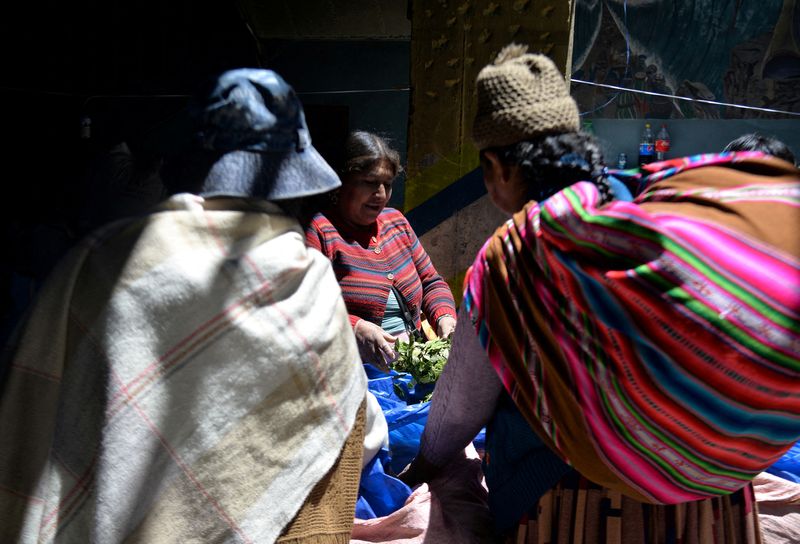By Raul Cortes and Daniel Ramos
LA PAZ (Reuters) - Bolivia's "economic miracle," a boom in the 2000s and 2010s that saw years of state spending lift millions of people into the middle class, is creaking, a warning sign to the wider region battling high inflation, shrinking government coffers and tepid growth.
For years the Andean country enjoyed one of South America's fastest economic growth rates as a boom in demand for natural resources - mainly gas - helped the former leftist government of President Evo Morales fund social programs and cut poverty.
But over the last decade gas production has tumbled by around a third, dragging down foreign currency reserves from over $15 billion in 2014 to $3.5 billion in February, when the central bank abruptly stopped publishing reserves data.
The drain in hard currency sparked panic earlier in the year, with Bolivians forming lines outside banks to withdraw dollars. Bond yields spiked sharply and in May the government was forced to sell half of its $2.6 billion gold reserves to raise cash.
"In practical terms, Bolivia ran out of liquidity," said economist Jose Gabriel Espinoza, a former central bank director.
Bolivia's government points to relatively robust economic growth of 3.5% in 2022 and inflation that remains low at around 3%, partly due to costly government subsidies for fuel.
"The Bolivian economy is stable, it is growing," Economy Minister Marcelo Montenegro told reporters this month.
But Bolivia's dwindling reserves and exports highlight a common vulnerability in Latin America, where most economies are highly reliant on commodities that are sensitive to see-sawing global prices, weather events and the political mood.
A major drought in Argentina has hammered grains output and reserves, imperiling a $44 billion debt deal with the International Monetary Fund. In global no. 2 copper producer Peru, mining investment is set to fall 19% this year and production has plateaued amid ongoing political unrest.
Alberto Ramos, Latin America economist at Goldman Sachs (NYSE:GS), said governments in Brazil, Chile and Colombia were also increasingly adopting policies of high taxes and public sector spending.
"The model is now shifting towards a very big state, a tax-and-spend approach," he said. "That's problematic given that the public sector is a very bad spender. That leads to macroeconomic underperformance... and you could eventually end up in a crisis."
The Bolivian government has sought to diversify the economy away from its over-reliance on gas by spurring production of soy and beef, while the gold sell-off will help bridge a public budget shortfall - but only for a short while.
"It has calmed people a bit... but that amount (gained from the gold reserves sale), $1.3 billion, is not enough for Bolivia," said local financial analyst Jaime Dunn. "We are in a moment of tense calm, where we have to see what will happen in the coming weeks."
'BUYING TIME'
At the start of the year some banks experienced runs to withdraw deposits amid fear over sliding reserves, while black market demand for dollars spiked, putting pressure on the boliviano's currency peg, which has been just under 7 per dollar since 2008.
In April, the government was forced to put major lender Banco Fassil into administration, though authorities said it was an isolated case due to mismanagement.
Moody's (NYSE:MCO) rating agency cut its rating on Bolivia's sovereign debt in March, saying foreign exchange issues put "macroeconomic stability at risk for Bolivia in general."
Sovereign bond yields soared from under 10%, where they had been for years, to a peak of over 40%, before settling around 25%.

Espinoza, the former central bank director, said the recent turbulence was putting at risk the big-spending "economic miracle" of Morales' ruling socialist MAS party. The government would have to shift tactics, he argued.
"Otherwise it will be very difficult for us to reach a scenario where macroeconomic accounts stabilize," he said. "If you don't solve this we are going to keep on just buying time. And at some point the gold is going to run out."